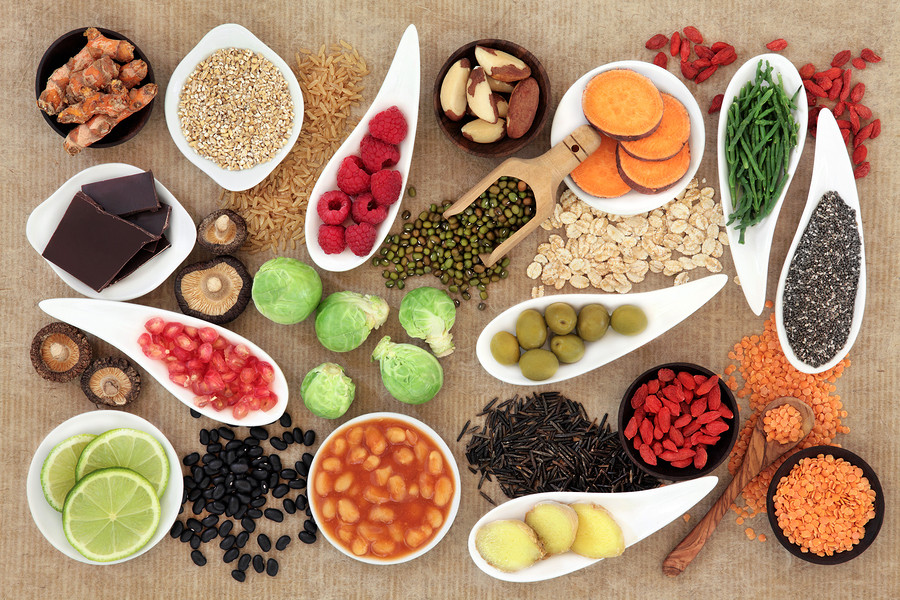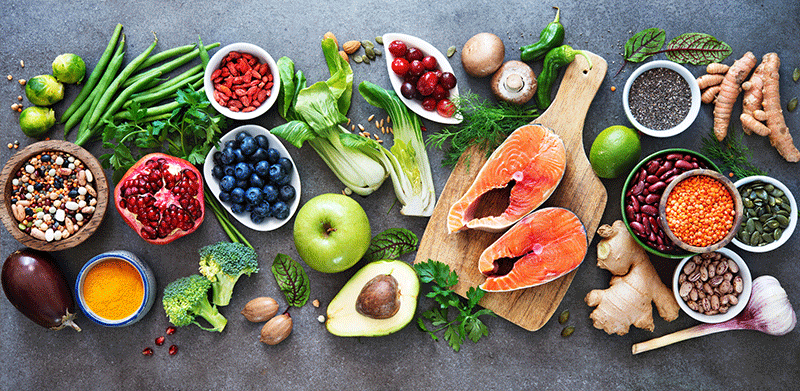Nutrition plays a vital role in our overall health and well-being. A well-balanced diet provides our bodies with the essential nutrients it needs to function optimally. It supports our physical, mental, and emotional health and helps us prevent chronic diseases. However, achieving a balanced diet can be a daunting task. With a myriad of food choices and nutrition information available, it can be overwhelming to know what and how much to eat. This article aims to simplify the complexities of nutrition and provide you with a comprehensive guide to creating a well-balanced diet.
Understanding the Essential Food Groups

A well-balanced diet includes a variety of foods from all the essential food groups:
Fruits
Fruits provide vitamins, minerals, antioxidants, and fiber. Aim for at least 2 cups of fruits daily. Choose a variety of fruits to get a wide range of nutrients.
Vegetables
Vegetables are rich in vitamins, minerals, antioxidants, and fiber. Aim for at least 2½ cups of vegetables daily. Include a variety of colors and types of vegetables to ensure a diverse intake of nutrients.
Whole Grains
Whole grains provide carbohydrates, fiber, vitamins, and minerals. Choose whole grains over refined grains whenever possible. Aim for at least 3 servings of whole grains daily.
Lean Protein
Lean protein sources provide amino acids, which are essential for building and repairing tissues. Choose lean meats, poultry, fish, eggs, beans, lentils, and nuts as your protein sources.
Dairy or Dairy Alternatives
Dairy products or dairy alternatives provide calcium, protein, and other essential nutrients. Aim for 3 servings of dairy or dairy alternatives daily.
Healthy Fats
Healthy fats, such as those found in avocados, nuts, seeds, and olive oil, provide energy and support various bodily functions. Incorporate these fats into your diet in moderation.
Balancing Macronutrients

Macronutrients are the three main nutrients that provide our bodies with energy: carbohydrates, proteins, and fats. Achieving the right balance of these macronutrients is crucial for a well-balanced diet.
Carbohydrates
Carbohydrates are the primary source of energy for our bodies. They are found in a variety of foods, including fruits, vegetables, grains, and dairy products. However, not all carbohydrates are created equal. Aim for complex, fiber-rich carbohydrates, such as whole grains, fruits, and vegetables, rather than refined or added sugars.
| Food Source | Carbohydrate Content |
|---|---|
| Whole wheat bread | 24g per slice |
| Oatmeal | 27g per cup (cooked) |
| Apple | 25g per medium apple |
| Broccoli | 6g per cup (cooked) |
Recommended daily intake: 45-65% of total caloric intake.
Protein
Proteins are essential for building and repairing tissues, as well as supporting various bodily functions. Choose lean, high-quality protein sources, such as lean meats, poultry, fish, eggs, beans, and lentils.
| Food Source | Protein Content |
|---|---|
| Chicken breast | 54g per 4 oz |
| Salmon | 34g per 4 oz |
| Eggs | 6g per large egg |
| Lentils | 18g per cup (cooked) |
Recommended daily intake: 10-35% of total caloric intake.
Fats
Fats provide energy, support cell growth, and aid in the absorption of certain vitamins. Focus on incorporating healthy, unsaturated fats, such as those found in avocados, nuts, seeds, and olive oil, while limiting saturated and trans fats.
| Food Source | Fat Content |
|---|---|
| Avocado | 15g per half avocado |
| Almonds | 14g per 1 oz |
| Olive oil | 14g per 1 tbsp |
| Butter | 11g per 1 tbsp |
Recommended daily intake: 20-35% of total caloric intake.
Micronutrient Balance
In addition to macronutrients, it’s essential to ensure you’re getting the right balance of micronutrients, which include vitamins and minerals. These essential nutrients play crucial roles in maintaining overall health and preventing deficiencies.
Vitamins
Vitamins are organic compounds that the body needs in small amounts to function properly. Some important vitamins include:
- Vitamin A: Supports vision, immune function, and skin health.
- Vitamin C: Boosts the immune system and aids in collagen production.
- Vitamin D: Promotes bone health and supports the immune system.
- Vitamin E: Acts as an antioxidant, protecting cells from damage.
- B Vitamins: Help convert food into energy and support nervous system function.
Minerals
Minerals are inorganic compounds that are essential for various bodily processes. Some important minerals include:
- Calcium: Supports bone and tooth health.
- Iron: Plays a role in red blood cell production and oxygen transport.
- Magnesium: Involved in muscle and nerve function, as well as energy production.
- Potassium: Helps regulate fluid balance and supports heart health.
- Zinc: Supports immune function and wound healing.
To ensure you’re meeting your micronutrient needs, focus on consuming a wide variety of fruits, vegetables, whole grains, lean proteins, and dairy or dairy alternatives. You may also consider taking a multivitamin supplement to fill any nutritional gaps.
Meal Planning for a Well-Balanced Diet
Developing a well-balanced diet is not just about understanding the essential food groups and macronutrients. It also requires careful meal planning to ensure you’re getting the right balance of nutrients throughout the day.
Creating a Balanced Plate
One simple way to ensure you’re getting a well-balanced meal is to follow the “Plate Method”:
- Fill half your plate with fruits and vegetables.
- Fill one-quarter of your plate with lean protein.
- Fill the remaining one-quarter with whole grains.
- Add a serving of dairy or a dairy alternative on the side.
This approach helps you achieve the right proportions of essential food groups and macronutrients in each meal.
Meal Prep and Batch Cooking
Meal prepping and batch cooking can be valuable tools in maintaining a well-balanced diet. By preparing meals in advance, you can ensure you have healthy, nutrient-rich options readily available throughout the week, which can help you avoid making less nutritious choices when pressed for time.
Some tips for successful meal prep and batch cooking:
- Plan your meals in advance and create a grocery list.
- Cook larger portions of proteins, grains, and vegetables that can be used in multiple meals.
- Invest in reusable containers to store your prepared meals.
- Experiment with freezer-friendly recipes that can be portioned and frozen for later use.
Snacking Strategically
Snacking can be a valuable part of a well-balanced diet, as it can help you maintain steady energy levels and prevent overeating at mealtimes. When choosing snacks, aim for options that provide a combination of macronutrients, such as:
- Fresh fruit with a serving of nuts or nut butter
- Yogurt with berries and a sprinkle of granola
- Sliced vegetables with hummus or a cheese stick
- Whole-grain crackers with tuna or cottage cheese
By incorporating strategic snacking into your routine, you can ensure your body is getting the nutrients it needs throughout the day.
Accommodating Dietary Restrictions and Preferences
One of the challenges of a well-balanced diet is accommodating individual dietary restrictions and preferences. Whether you’re following a specific diet for health reasons or personal preferences, it’s important to find ways to ensure you’re still meeting your nutritional needs.
Vegetarian and Vegan Diets
Vegetarian and vegan diets can be highly nutritious, but they require careful planning to ensure you’re getting all the necessary nutrients, such as protein, iron, and vitamin B12. Some strategies for a well-balanced vegetarian or vegan diet include:
- Incorporating a variety of plant-based protein sources, such as beans, lentils, tofu, tempeh, and quinoa.
- Ensuring adequate intake of iron-rich foods, such as leafy greens, fortified cereals, and legumes.
- Supplementing with vitamin B12, as it’s primarily found in animal-based products.
Gluten-Free Diets
For individuals with celiac disease or gluten intolerance, following a gluten-free diet is essential. When adhering to a gluten-free diet, it’s important to focus on naturally gluten-free foods, such as fruits, vegetables, lean proteins, and gluten-free grains like quinoa, rice, and corn.
Lactose-Intolerant or Dairy-Free Diets
Individuals with lactose intolerance or those who choose to eliminate dairy from their diets can still maintain a well-balanced diet by incorporating dairy alternatives, such as almond, soy, or oat milk, as well as calcium-fortified products.
Dietary Restrictions Due to Medical Conditions
Certain medical conditions, such as diabetes, heart disease, or kidney disease, may require specific dietary restrictions. It’s essential to work closely with a healthcare professional, such as a registered dietitian, to develop a well-balanced meal plan that addresses your individual needs.
Accommodating dietary restrictions and preferences requires creativity and a willingness to explore new foods and recipes. By focusing on nutrient-dense options and making appropriate substitutions, you can maintain a well-balanced diet that aligns with your unique needs and preferences.
Sustainable Eating Habits
Achieving a well-balanced diet is not a one-time event; it’s a lifelong journey that requires the development of sustainable eating habits. Incorporating the following strategies can help you maintain a healthy, balanced diet in the long run.
Mindful Eating
Mindful eating involves being present and attentive during the act of eating. This can help you develop a healthier relationship with food and make more informed choices. Some mindful eating practices include:
- Eating slowly and savoring each bite
- Avoiding distractions, such as TV or smartphones, during meals
- Tuning in to your body’s hunger and fullness cues
- Practicing gratitude for the food you’re consuming
Flexible Meal Planning
While it’s important to have a well-balanced diet, it’s also essential to allow for flexibility and occasional indulgences. Rigid diets can be unsustainable and lead to feelings of deprivation. Incorporate some of your favorite less-nutritious foods in moderation, and focus on making healthier choices the majority of the time.
Consistent Hydration
Staying hydrated is a crucial component of a well-balanced diet. Aim to drink at least 8 cups of water per day, and more if you’re physically active or in a warm environment.
Regular Physical Activity
Pairing a well-balanced diet with regular physical activity is essential for overall health and wellness. Aim for at least 150 minutes of moderate-intensity exercise or 75 minutes of vigorous-intensity exercise per week, in addition to incorporating strength training exercises a few times a week.
Stress Management
Chronic stress can have a negative impact on your eating habits and overall health. Practice stress management techniques, such as meditation, yoga, or simply taking regular breaks throughout the day, to maintain a well-balanced lifestyle.
By incorporating these sustainable eating habits into your daily routine, you can create a balanced diet that becomes a natural and enjoyable part of your lifestyle.
Achieving a well-balanced nutrition diet is not a one-size-fits-all solution. It requires an understanding of the essential food groups, macronutrients, and micronutrients, as well as the ability to plan and prepare meals that cater to your individual needs and preferences. By following the strategies outlined in this article, you can unlock the secrets to a well-balanced nutrition diet and enjoy the numerous benefits it provides for your overall health and well-being.
Remember, the journey to a healthier, more balanced diet is a lifelong process. Be patient, experiment with different foods and recipes, and find what works best for you. With dedication and a willingness to make sustainable changes, you can achieve and maintain a well-balanced nutrition diet that supports your body, mind, and overall quality of life.
